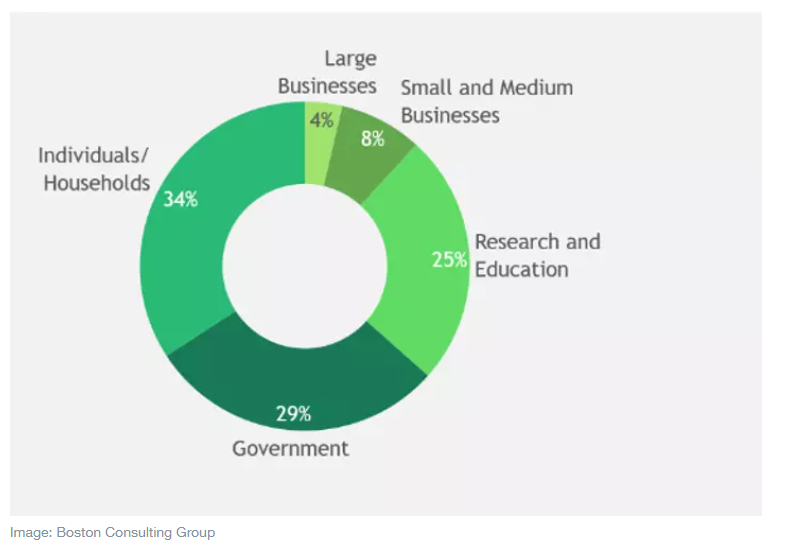by Brandon Magsamen and Grigory Shutko*
Tech has been deployed throughout the pandemic to keep economies going and to keep people connected, healthy and safe. Most solutions and discussions, however, have been skewed towards helping individuals or public entities. Most do not address the needs of small and medium sized businesses (SMBs) and this group cannot be ignored.

The response gap
The existing focus of the tech response has been directed toward governments, research/education, and individuals. A recent Boston Consulting Group analysis of technology use cases shows that these sectors received nearly 90% of tech’s COVID response while only 10% of solutions were geared towards SMBs.
This disparity was appropriate in the pandemic’s initial phases, as the globe shifted to fight the virus. New and repurposed technologies rapidly helped to address these issues as they arose. But as the world settles into a “new normal”, one that includes quarantines and ongoing lockdowns our attention must include how tech companies can support small and medium business, especially as businesses will struggle to survive a second wave.
SMBs are typically categorized as those formal and informal companies employing fewer than 250 individuals. Despite their size, small and medium businesses constitute a significant portion of the global economy in terms of jobs and GDP. According to recent research, they account for two-thirds of total employment in the world, contribute 35-50% of national GDP globally, and driving over two-thirds of new job creation.
These businesses face outsized challenges to overcome in the wake of the pandemic [See Exhibit Below]. With less access to capital and cash reserves, SMBs are likely to find it difficult to ‘ride out’ the lasting effects of the pandemic or alter their business model to adapt. They have less robust business contingency plans kicking in during the crisis. Relying on fewer suppliers places the companies at higher risk of disruption if their partners are affected. On the demand front, SMBs tend to operate in those sectors hardest hit by the pandemic such as retail, personal services, and tourism.
All these factors will contribute to the fact that many small and medium sized businesses were forced to close their doors during the pandemic and will never reopen. Data suggests that bankruptcy rates for SMBs doubled during the spring and early summer lockdowns imposed by governments around the world. Countries’ GDP will disappear with those closings. While new players are likely to fill the void, this process takes considerable time, slowing the recovery.
Focusing on small and medium business also makes sense strategically. The incredible portion of employment and GDP attributed to SMBs is indicative of their share of global demand for enterprise solutions. Investing now to build relationships and rebound the economy will help retain existing customers and attract new, long-term customers. These customers across the world are digitizing their processes, and now is the time for tech and telco firms to work alongside them for mutual benefit. While government support could be a lifeline for SMBs during the lockdowns, it is crucial on both a macro and micro position that SMBs receive adequate attention and support to enable their operations in the highly digitized “new normal”, as the global economy begins to recover.
Tech’s unique role
Tech companies are positioned to help SMBs access needed financing, adapt to new working models, and ultimately return to work safely. Being the main drivers of the economy in the “new normal”, they are the products and service providers with expertise and financial flexibility to support SMBs in their adaptation to the digital-first world.
Some solutions are emerging: online advertising credits - granted by companies like Google, they can be used by small businesses to offset payments for advertisements on the platform that will bring online customers to existing business or new digital offerings, which is vital during lockdowns; business-centric return to work solutions like those from Salesforce, Microsoft and UnitedHealth Groups and many other tech players can reduce efforts required for manual tracing of cases inside the company, but also allow SMBs to collaborate in person or provide in-person services to B2B and B2C customers; and waiving fees for mobile payments for products and services can unlock more digital transactions and reduce personal contact even when selling products in store. This is particularly crucial in places which heavily rely on mobile payments in commerce, like in many African countries.
Devising appropriate aid to these businesses across the globe requires consideration of where businesses are currently in their adoption of technology. Adoption of digital technologies among SMBs lags that of larger firms and varies within the sector. Providing telecommunications support before businesses have access to necessary hardware will not produce optimum results. Likewise, technical education must be tailored to the level of the targeted audience. SMBs are often too small for corporations to work with and help build their capabilities as they would with larger customers; hence, understanding the unique needs and level of maturity of SMBs in every country and market segment, while providing solutions in a way that helps SMBs to adopt them fully without extra support is going to be live saving. We will need solutions across the tech stack to help all businesses. The pandemic is a global issue and requires a nuanced global response.
While we have seen some response from the Tech industry to date, we need to do more if we are to protect our small and medium businesses from becoming another COVID-19 casualty. Existing aid has been creative and likely helpful, but tech companies must now step up their initiatives to help considering the wide range of possible technical needs. This effort will likely require more public-private collaboration with national governments, especially on connectivity and digital inclusion of SMBs, but given that the global economic recovery in part depends on these businesses to rebound to contribute their job creation and GDP contributions, this collaboration should rather start sooner than later.
*Principal , The Boston Consulting Group and Platform Curator, Information Technology Industry, World Economic Forum
**first published in: www.weforum.org




 By: N. Peter Kramer
By: N. Peter Kramer
